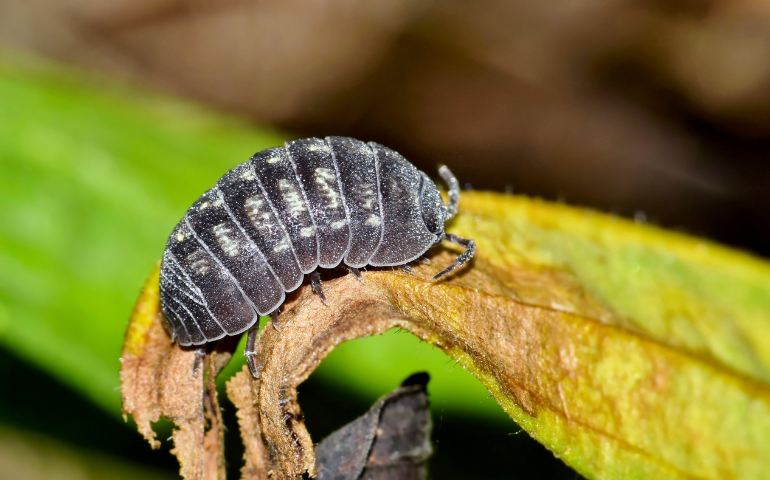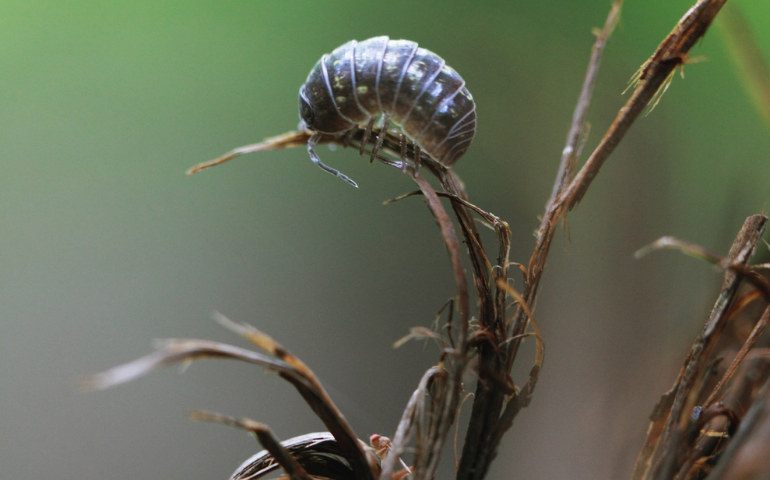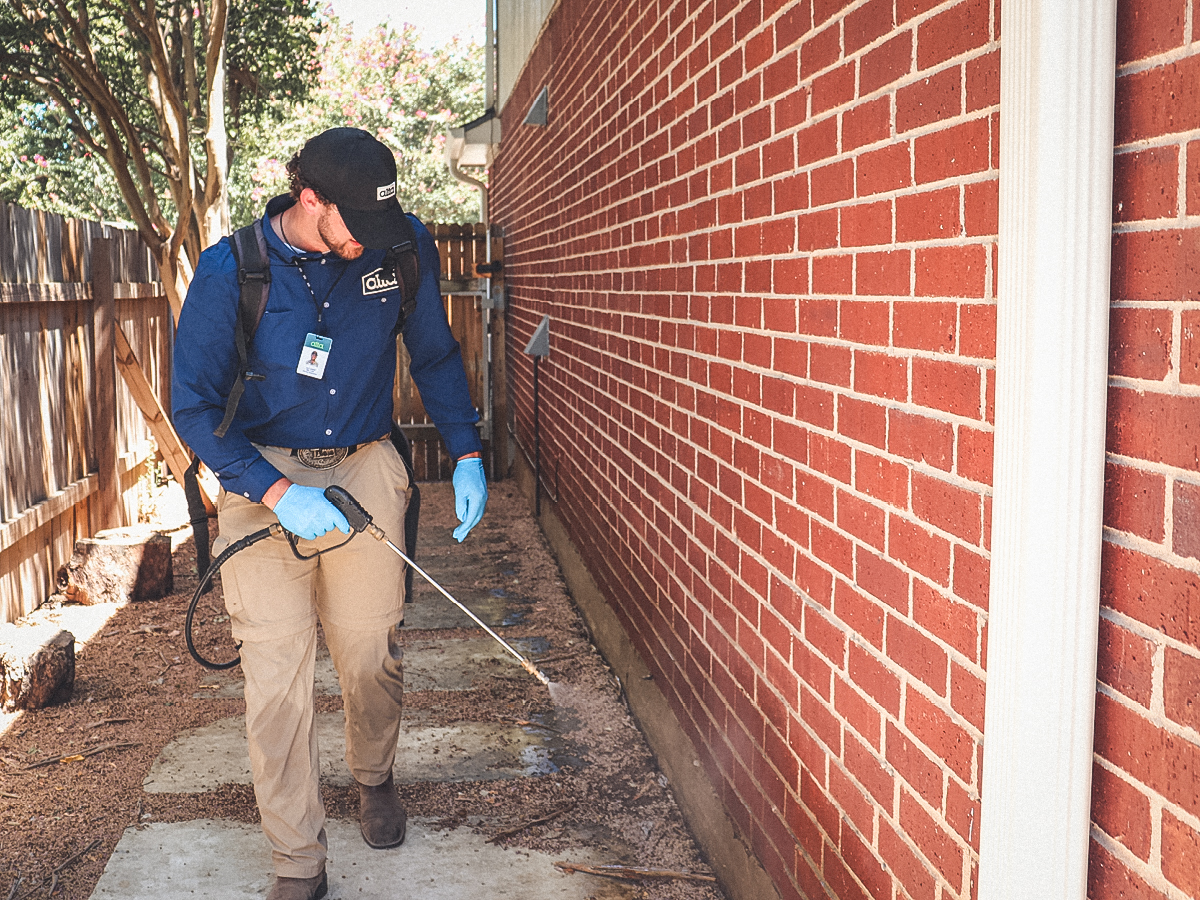If you’ve spotted small gray bugs that curl into a ball when touched, you’re likely seeing pill bugs—also called roly-polies. These crustaceans are common in gardens, especially in moist, shaded areas. While they play a helpful role in breaking down organic matter, too many can lead to problems in your garden.
In this post, we’ll go over why pill bugs show up in garden beds, how they affect your plants, and the most effective ways to get rid of them. We’ll also share helpful moisture control tips to keep them from coming back. If you’re seeing more pill bugs than usual, we’re here to help.
Key Takeaways About Pill Bugs in the Garden
- Pill bugs help break down organic material but may damage young seedlings and ripe fruits in large numbers
- They thrive in damp areas like mulch, compost, or overwatered soil
- Reducing moisture and improving airflow are key to prevention
- DIY methods are hit-or-miss and often don’t solve the root problem
- Our quarterly pest control service treats your garden and yard to keep pill bugs away year-round
Why Pill Bugs Are in Your Garden

Pill bugs are drawn to damp, shaded environments with plenty of decaying plant matter. That’s why gardens with heavy mulch, leaf litter, or poor drainage often become hotspots for pill bug activity. You’ll usually find them under pots, rocks, wood, or even the base of your plants.
While they’re helpful in small numbers—breaking down debris and improving soil health—they can quickly become a problem. When the population grows, they may start feeding on seedlings, soft fruits, and stems near the ground.
Overwatering, compacted soil, and dense plantings can create the kind of environment pill bugs love. Keeping your garden balanced is key to preventing them from taking over.
Are Pill Bugs Harmful to Plants?

Pill bugs are mostly decomposers, meaning they feed on dead organic matter. But when there’s too much moisture and not enough ventilation, they may start snacking on live plants—especially tender seedlings, roots, and soft fruits like strawberries or squash that rest directly on the soil.
Established plants aren’t usually affected, but young vegetables or herbs can be at risk. If you’re noticing small chew marks, wilting, or missing sprouts, pill bugs could be part of the problem.
They’re not the worst pest out there, but they can still cause damage if left untreated—especially when paired with other moisture-loving pests like slugs.
Do DIY Methods Work for Pill Bugs?
Some gardeners try DIY treatments like coffee grounds, diatomaceous earth, or vinegar sprays, but these only offer temporary relief. In most cases, they don’t address what’s really attracting pill bugs: too much moisture and too much organic debris.
Here’s what you can do to naturally reduce pill bug activity:
- Avoid overwatering your garden beds
- Improve drainage by mixing compost or sand into heavy soil
- Use thin layers of mulch, and keep it away from the base of your plants
- Remove rotting wood, cardboard, or leaves where pill bugs can hide
- Trim overgrown plants to improve airflow around the soil
These steps can help keep the environment less inviting for pill bugs and make your garden healthier overall.
How to Get Rid of Pill Bugs in Your Garden

If pill bugs are starting to take over, our home pest control service includes everything you need to get them under control.
We spray around the perimeter of your garden and spread granules throughout the yard. Once those granules are activated by water, they go to work eliminating pill bugs and other yard pests. The treatment won’t harm your plants—it only targets the bugs causing problems.
We come back quarterly to keep your garden protected, adjusting the treatment each season to account for new pest activity. If moisture levels are a concern, we’ll recommend simple ways to improve drainage and reduce excess moisture to help keep pill bugs from coming back.
Our pill bug treatment is designed to support a healthy garden while keeping pests away for good.
How to Prevent Pill Bugs From Coming Back
Once pill bugs are under control, it’s important to make your garden less appealing to them. Moisture is the biggest factor, so here are some quick prevention tips:
- Water early in the day so soil has time to dry out
- Avoid overwatering or using thick mulch near the base of your plants
- Rake up fallen leaves, dead plants, or anything else pill bugs could hide under
- Use raised beds to keep fruits and vegetables off the ground
- Thin out crowded plants to improve airflow and reduce humidity
Our quarterly pest control service helps reinforce these efforts by keeping your yard treated year-round. It’s an easy way to protect your garden without the guesswork or hassle of dealing with pests on your own.
Get Help With Pill Bugs Today
Pill bugs in the garden can be helpful in moderation—but too many can start damaging your plants. If you’re dealing with a growing pill bug problem or just want to prevent future issues, we’re here to help.
Our team provides effective treatments that won’t harm your garden, along with ongoing support to keep pests away for good. If you’re ready for a healthier yard and garden, give us a call.
Contact us today to learn more about our services and get started.
Frequently Asked Questions
Why do pill bugs show up in my garden?
They’re attracted to moisture, mulch, compost, and areas with decaying organic matter. Damp soil and dense vegetation create the perfect environment.
Can pill bugs damage my plants?
Yes. While they mostly eat dead material, they can feed on seedlings, roots, and fruits that sit on the ground—especially in large numbers.
Do home remedies work?
Not very well. They may offer short-term relief but don’t address the underlying moisture issues that attract pill bugs.
How does your treatment work?
We spray around the garden and spread granules throughout the yard. Once watered, the granules target pill bugs without harming your plants.
How often should I treat for pill bugs?
Our quarterly service keeps pill bugs and other pests under control year-round, with treatments spaced out every season.
Share article:
